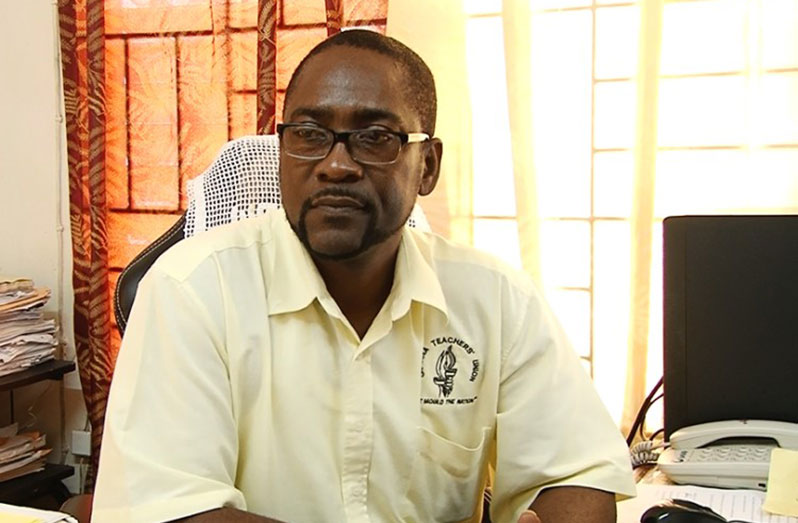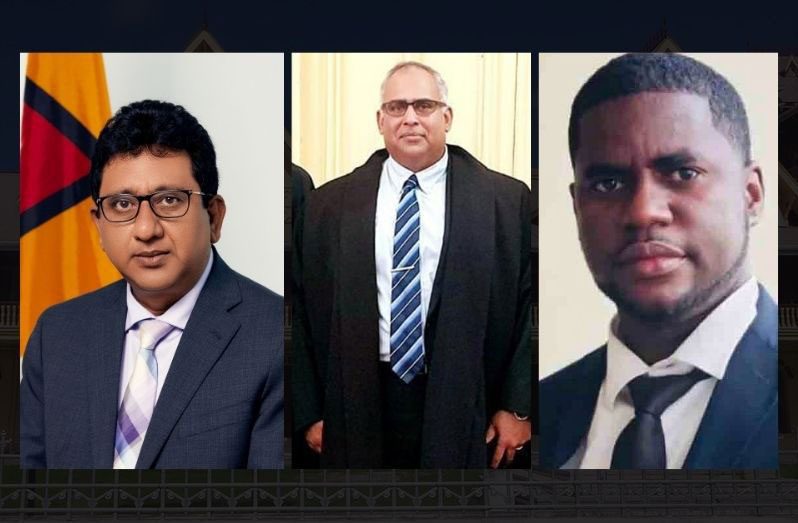–AG says labour relations, fate of future strikes now at stake
THE government has announced plans to appeal Friday’s ruling that declared the recent teachers’ strike “legal and justifiable”.
Attorney-General and Legal Affairs Minister Anil Nandlall, SC, told reporters following the ruling that the contentious decision highlights the delicate balance between the rights of educators, and by extension all workers, and the responsibilities of the State.
In an oral decision lasting nearly four hours, Demerara High Court Judge Justice Sandil Kissoon held that the teachers’ strike was legitimate since collective bargaining between the Ministry of Education and the union had not been properly undertaken.
The Guyana Teachers’ Union (GTU)’s action against the government, in which the Guyana Trades Union Congress (GTUC) was added as an intervener, was centred on whether teachers can legally refuse to work while still being paid, as a form of protest or negotiation.
In his decision, the judge stated that there was evidence to show that the government failed to engage the union in collective bargaining, unilaterally forced salary hikes on teachers, and snubbed or rebuffed the union’s “every attempt” to negotiate collectively, as envisaged by Article 147 (3) of the Guyana Constitution, which states that neither an employer nor a trade union shall be denied the right to enter into collective arguments.
As the legal battles heat up, the Attorney- General has stated that the fate of future strikes, as well as the larger landscape of labour relations, are at stake. He insists that the ruling is bad in law.
The stage is now set for a lengthy judicial battle that could reach all the way to the country’s apex court, the Caribbean Court of Justice (CCJ), as the government prepares to challenge Justice Kissoon’s “erroneous” ruling.
“In my view, the judge has committed grave and substantial errors in large numbers,” said the Attorney-General when asked by reporters for a reaction to the ruling.

FREEDOM VERSUS RIGHT
He argued that Justice Kissoon’s judgement is deficient, because it failed to address the distinction between the “right to strike” and a “freedom to strike”.
“I began this case by saying that striking is a legitimate form of expression in our law. It was once illegal, but now it is legal. But whether it has reached and has been elevated to a right as opposed to a freedom is where a distinction has to be drawn,” Nandlall said.
According to Nandlall, the Constitution refers to a “freedom to strike”, and that a freedom, by definition, includes options. “So, you have options to do things. And why that is important? Because those options carry with them, when you exercise them, certain consequences.”
The Senior Counsel reasoned that a consequence of the exercise of one’s right to freedom is the corollary of not being paid for the exercise of that freedom.
He added: “What the judge has found is that you have a right to strike. In doing so, he has misread the Constitution. He has equated the term freedom with right, but he has not addressed the other repercussions, because now you will have striking working who are going to be compensated for work not done. What [he] has done there…is that [he] has turned the law upside down…”
Nandlall stressed that the government’s decision to deduct and send union dues was voluntary, not legally binding.
“It’s not grounded in the Constitution, it’s not grounded in contract, it’s not grounded in any other obligation. So, is it that the government for the rest of its life must continue offering this gratuitous service?” he asked.
As such, the Attorney General questioned the basis for the Judge’s declaration that the government’s decision to halt the deduction and remittance of those dues were arbitrary.
DUTY
Meanwhile, the judge stated that under the Constitution—the supreme law of the land—and the Trade Union Recognition Act, the government had a duty to engage the GTU in collective bargaining.
As a result, the judge concluded that the teachers’ strike was “legal and justified” because their employer (the government) denied them the right to collective bargaining.
The judge so confirmed the “fundamental right to strike” as a means of demanding better working conditions, remuneration, and other benefits. Justice Kissoon did so by citing established constitutional protections, Commonwealth case law, legal passages, international conventions, and labour standards.
Nandlall had argued that the government, as an employer, has the legal authority to withhold money from pay cheques in cases where labour is not provided. He had reasoned that this rationale was founded on the common law principle of “no work, no pay”. However, Justice Kissoon rejected this argument, citing the fact that it is irrelevant to the case at hand.
According to the judge, a common law principle cannot “abrogate, erode, or undermine” the constitutional right to strike. Justice Kissoon ruled that the government’s intention of deducting money from striking teachers’ salaries and stopping the deduction of union dues from educators’ salaries and sending it to the GTU were illegal, arbitrary, unilateral, unconstitutional, and discriminatory because, given the circumstances case, there was a legitimate right to strike.
Justice Kissoon further determined that the government’s intent to end deductions was illegal and that this decision must be quashed because it was intended to undermine the union.
“The right to strike is a union’s ultimate weapon”, the judge so declared, stating that “wages and salaries cannot be deducted or withheld” from teachers who participated in the strike.
The judge, in granting corresponding declarations against the government, said that “teachers lifted their voices and they asked for bread and they were given stones.”
GTUC’s lawyer Roysdale Forde, SC welcomed Justice Kissoon’s ruling stating that it has expanded workers’ rights and pushed the boundaries of what is known as labour rights in Guyana.
Describing Friday’s ruling as “significant” and “landmark”, he said: “I can’t underscore it enough but this is a significant win for labour and workers in this country.”
He expressed confidence that the ruling would withstand any appeal.
GTU was represented by Attorney-at-Law Darren Wade.
The government was ordered to pay the GTU $500,000 in costs and GTUC, $750,000 in costs.

COURT-ORDERED MEDIATION
Teachers began a nationwide industrial action for better wages and salaries and other benefits on February 5, 2024. Teachers were on strike, according to the GTU, because the government would not meet with the union on several issues, including negotiations on wages, salaries, allowances, and other benefits for teachers. The strike was eventually called off of March 4, 2024 as a result of court-ordered mediation conducted by two Senior Counsel, Edward Luckhoo and Robin Stoby.
The teachers went on strike despite the fact that the Ministry of Education has satisfied more than half of the 41 proposals made by the GTU for better working conditions in just three years.
Government officials had also challenged the union’s claims by highlighting that discussions were ongoing to satisfy the other requests. Since the requirements for conducting a strike were not satisfied, the government had declared that the strike action was illegal.



.jpg)








